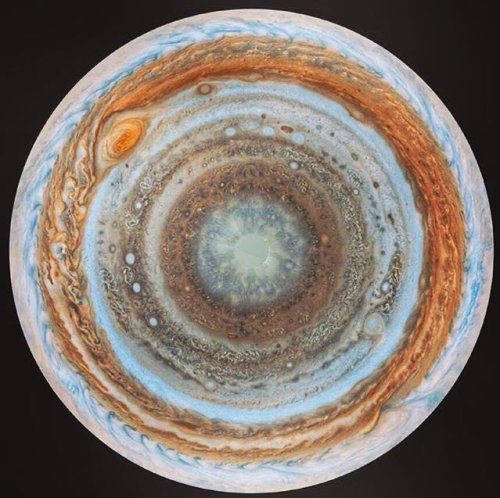MARTIAN STORMS - Seen In 1977 By The Viking 2 Orbiter


MARTIAN STORMS - Seen in 1977 by the Viking 2 Orbiter
“Like its predecessor, the Viking 2 mission consisted of a lander and an orbiter designed to take high-resolution images, and study the Martian surface and atmosphere. Both the Viking 1 and 2 landers benefited greatly from their orbiting counterparts, which snapped images that helped mission controllers navigate the landers to safe landing sites.”
This particular image was taken by the Viking 2 Orbiter and shows a massive dust storm on the red planet. This spectacular storm can be seen on a global scale. The Viking 2 mission would end 3 years later on April 11, 1980.
Credit: NASA/JPL
More Posts from Littlecadet-biguniverse and Others

Galaxy Trio Arp 286:
NGC 5566 (bottom), NGC 5569 (left), & NGC 5560 (center)

Crab Pulsar at the core of the Crab Nebula

Hubble Spots a Secluded Starburst Galaxy : This image, taken by the NASA/ESA Hubble Space Telescopes Advanced Camera for Surveys
js

Uranus’ icy moon Miranda wowed scientists during the Voyager encounter with its dramatically fractured landscapes.
via reddit
Just so you know, you can always watch the Earth live from the ISS. Its really relaxing to me

A Black Hole Choir : The blue dots in this field of galaxies, known as the COSMOS field, show galaxies that contain supermassive black holes emitting high-energy X-rays.
js

Jupiter’s south pole, taken by Cassini

Juno Arrives at Jupiter Today!
Today on the 4th of July, 2016 (barring any tragic occurrence with the engine firing) NASA’s Juno spacecraft will enter into orbit around Jupiter.
It’s been traveling since 2011 and carries thick shielding to protect its instruments from the dangerous fields of radiation surrounding the planet.
Juno’s not the first spacecraft to go to Jupiter, but it will be the closest. I like to imagine that Juno will look like a scene from Alien: Isolation where you get to look out the window and see that massive gas giant below you.
The goals of this mission are essentially thus: investigate the weather, atmosphere and magnetosphere on Jupiter.
Moving into a grander context, as answers start to come in and we learn more about Jupiter’s nature we hope to learn more about the questions we must be asking in order to investigate the formation of our very solar system on a deeper level.
Of course with any luck and a lot of hard work, we will be able to build a more harmonious theory of how a star system forms, and the things that go into the construct of a massive gas giant.
(Image credit: NASA and JPL)
-
 mermaid7777 reblogged this · 1 year ago
mermaid7777 reblogged this · 1 year ago -
 crazydreamsaboutyou liked this · 2 years ago
crazydreamsaboutyou liked this · 2 years ago -
 moonstar-magic liked this · 2 years ago
moonstar-magic liked this · 2 years ago -
 carnalreincarnated liked this · 2 years ago
carnalreincarnated liked this · 2 years ago -
 hellfighter8 reblogged this · 2 years ago
hellfighter8 reblogged this · 2 years ago -
 julietaipunto reblogged this · 2 years ago
julietaipunto reblogged this · 2 years ago -
 julietaipunto liked this · 2 years ago
julietaipunto liked this · 2 years ago -
 stanto30 liked this · 2 years ago
stanto30 liked this · 2 years ago -
 motormann liked this · 2 years ago
motormann liked this · 2 years ago -
 hellfighter8 liked this · 2 years ago
hellfighter8 liked this · 2 years ago -
 tangy-pisces reblogged this · 2 years ago
tangy-pisces reblogged this · 2 years ago -
 nospheratusblack liked this · 2 years ago
nospheratusblack liked this · 2 years ago -
 coffeenuts reblogged this · 2 years ago
coffeenuts reblogged this · 2 years ago -
 coffeenuts liked this · 2 years ago
coffeenuts liked this · 2 years ago -
 hobbyhermit liked this · 5 years ago
hobbyhermit liked this · 5 years ago -
 snake420s liked this · 6 years ago
snake420s liked this · 6 years ago -
 sugaarpeas liked this · 7 years ago
sugaarpeas liked this · 7 years ago -
 fa2ff liked this · 7 years ago
fa2ff liked this · 7 years ago
GREETINGS FROM EARTH! Welcome to my space blog! Let's explore the stars together!!!
144 posts